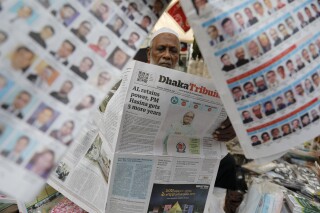Hasina’s reelection has some worried that Bangladesh could be slipping from democracy to autocracy

A man reads a Bangladeshi newspaper that has the news of Prime Minister Sheikh Hasina’s election victory in Dhaka, Bangladesh, Jan.8, 2024. (AP Photo/Mahmud Hossain Opu)
DATE OF ELECTION
Jan. 7
TYPE OF ELECTION
Parliamentary
WHO’S RUNNING
Prime Minister Sheikh Hasina swept to power for a fourth consecutive term following an election earlier in January that was boycotted by opposition parties and marked by violent protests and international scrutiny. The Bangladesh Nationalist Party shunned the polls and called it a one-sided farce, leaving little challenge to Hasina. In its place were a swath of smaller opposition parties and independent candidates, many of whom were from Hasina’s Awami League party. With her victory, the 76-year-old leader sealed her fifth term as prime minister.
WHY IT MATTERS TO THE WORLD
The polls, which saw 41% voter turnout, spotlighted a troublesome electoral record - the third in the last 15 years to be dogged by credibility concerns. The United States and the United Kingdom have expressed concern over democratic standards in Bangladesh and said the election was not free and fair. Hasina has helped improve the country’s economy and turned its garment sector into one of the world’s most competitive. She’s also credited with neutralizing Islamic militancy and has skillfully balanced ties with the likes of India, China, Russia and the West. But her critics believe she has increasingly turned autocratic while in power and say the election, which came amid a clampdown on political foes, leaves Bangladesh’s democracy in a fragile position that could fan more turmoil and test some of its diplomatic ties.
For more on Bangladesh’s election, click here
To see how other 2024 elections could affect the world, click here
